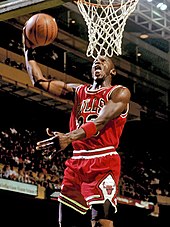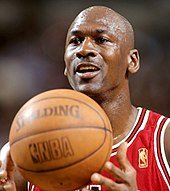MICHAEL JORDAN " SU MAJESTAD"
HELLO I BRING YOU A SMALL CONTENT ABOUT THE BEST BASKETBALL PLAYER IN HISTORY, I DID NOT SEE IT PLAY BECAUSE I WAS VERY YOUNG BUT I HAVE BEEN INTERESTED IN INVESTIGATING ABOUT IT, THAT'S WHY I SHARE IT WITH YOU! AT THE END OF THE CONTENT IS THE BIBLIOGRAPHIC QUOTE, I HOPE YOU ENJOY IT AND THANK YOU FOR READING.

Michael Jeffrey Jordan (born February 17, 1963), also known by his initials, MJ, is an American retired professional basketball player, businessman, and principal owner and chairman of the Charlotte Hornets of the National Basketball Association (NBA). Jordan played 15 seasons in the NBA for the Chicago Bulls and Washington Wizards. His biography on the NBA website states: "By acclamation, Michael Jordan is the greatest basketball player of all time.” Jordan was one of the most effectively marketed athletes of his generation and was considered instrumental in popularizing the NBA around the world in the 1980s and 1990s.
Jordan played three seasons for coach Dean Smith at the University of North Carolina. As a freshman, he was a member of the Tar Heels' national championship team in 1982. Jordan joined the Bulls in 1984 as the third overalldraft pick. He quickly emerged as a league star, entertaining crowds with his prolific scoring. His leaping ability, demonstrated by performing slam dunks from the free throw line in slam dunk contests, earned him the nicknames Air Jordan and His Airness. He also gained a reputation for being one of the best defensive players in basketball. In 1991, he won his first NBA championship with the Bulls, and followed that achievement with titles in 1992 and 1993, securing a "three-peat". Although Jordan abruptly retired from basketball before the beginning of the 1993–94 NBA season and started a new career playing minor league baseball, he returned to the Bulls in March 1995 and led them to three additional championships in 1996, 1997, and 1998, as well as a then-record 72 regular-season wins in the 1995–96 NBA season. Jordan retired for a second time in January 1999, but returned for two more NBA seasons from 2001 to 2003 as a member of the Wizards.
Jordan's individual accolades and accomplishments include five Most Valuable Player (MVP) Awards, ten All-NBAFirst Team designations, nine All-Defensive First Team honors, fourteen NBA All-Star Game appearances, three All-Star Game MVP Awards, ten scoring titles, three steals titles, six NBA Finals MVP Awards, and the 1988 NBA Defensive Player of the Year Award. Among his numerous accomplishments, Jordan holds the NBA records for highest career regular season scoring average (30.12 points per game) and highest career playoff scoring average (33.45 points per game). In 1999, he was named the greatest North American athlete of the 20th century by ESPN, and was second to Babe Ruth on the Associated Press's list of athletes of the century. Jordan is a two-time inductee into the Basketball Hall of Fame, having been enshrined in 2009 for his individual career, and again in 2010 as part of the group induction of the 1992 United States men's Olympic basketball team ("The Dream Team"). He became a member of the FIBA Hall of Fame in 2015.
Jordan is also known for his product endorsements. He fueled the success of Nike's Air Jordan sneakers, which were introduced in 1985 and remain popular today. Jordan also starred in the 1996 film Space Jam as himself. In 2006, he became part-owner and head of basketball operations for the then-Charlotte Bobcats, buying a controlling interest in 2010. In 2015, Jordan became the first billionaire NBA player in history as a result of the increase in value of NBA franchises. He is the third-richest African-American, behind Oprah Winfrey and Robert F. Smith.
Jordan was a shooting guard who was also capable of playing as a small forward (the position he would primarily play during his second return to professional basketball with the Washington Wizards), and as a point guard. Jordan was known throughout his career for being a strong clutch performer. With the Bulls, he decided 25 games with field goals or free throws in the last 30 seconds, including two NBA Finals games and five other playoff contests. His competitiveness was visible in his prolific trash-talk and well-known work ethic. As the Bulls organization built the franchise around Jordan, management had to trade away players who were not "tough enough" to compete with him in practice. To help improve his defense, he spent extra hours studying film of opponents. On offense, he relied more upon instinct and improvisation at game time. Noted as a durable player, Jordan did not miss four or more games while active for a full season from 1986–87 to 2001–02, when he injured his right knee. He played all 82 games nine times. Jordan has frequently cited David Thompson, Walter Davis, and Jerry West as influences. Confirmed at the start of his career, and possibly later on, Jordan had a special "Love of the Game Clause" written into his contract (unusual at the time) which allowed him to play basketball against anyone at any time, anywhere.
Jordan had a versatile offensive game. He was capable of aggressively driving to the basket, as well as drawing fouls from his opponents at a high rate; his 8,772 free throw attempts are the ninth-highest total of all time. As his career progressed, Jordan also developed the ability to post up his opponents and score with his trademark fadeaway jump shot, using his leaping ability to "fade away" from block attempts. According to Hubie Brown, this move alone made him nearly unstoppable. Despite media criticism as a "selfish" player early in his career, Jordan's 5.3 assists per game also indicate his willingness to defer to his teammates. After shooting under 30% from three-point range in his first five seasons in the NBA, including a career-low 13% in the 1987–88 season, Jordan improved to a career-high 50% in the 1994–95 season.[18] The three-point shot became more of a focus of his game from 1994–95 to 1996–97, when the NBA shortened its three-point line to 22 ft (6.7 m) (from 23 ft 9 in (7.24 m)). His three-point field-goal percentages ranged from 35% to 43% in seasons in which he attempted at least 230 three-pointers between 1989–90 and 1996–97. For a guard, Jordan was also a good rebounder (6.2 per game).[18]
In 1988, Jordan was honored with the NBA's Defensive Player of the Year Award and became the first NBA player to win both the Defensive Player of the Year and MVP awards in a career (since equaled by Hakeem Olajuwon, David Robinson, and Kevin Garnett; Olajuwon is the only player other than Jordan to win both during the same season). In addition, he set both seasonal and career records for blocked shots by a guard,[151] and combined this with his ball-thieving ability to become a standout defensive player. He ranks third in NBA history in total steals with 2,514, trailing John Stockton and Jason Kidd. Jerry West often stated that he was more impressed with Jordan's defensive contributions than his offensive ones. He was also known to have strong eyesight; broadcaster Al Michaels said that he was able to read baseball box scores on a 27-inch television clearly from about 50 feet away.
